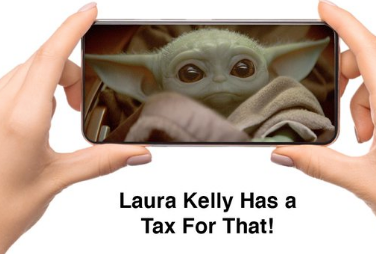
By JOHN HANNA
TOPEKA, KAN. (AP) —Opposition from top Republican lawmakers in Kansas appears to have doomed Democratic Gov. Laura Kelly's plan to tax streaming services, e-books, and movie and music downloads like most other states do.
Kelly and fellow Democrats pitch it as basic fairness. Consumers who buy or rent a DVD of their favorite “Star Wars” movie or go to the movie theater pay the state's 6.5% sales tax, but they don't if they stream or download the same movie.
The idea is hardly new: Thirty-three states have some form of such a tax, according to the Tax Foundation, a conservative-leaning Washington-based think tank.
But Republicans in the GOP-controlled Kansas Legislature strongly oppose the idea, arguing that such a tax would have little public support. The Republican Governors Association mocked Kelly this week as “Liberal Laura” and suggested she was “trailblazing” in finding new ways to pull dollars from people's pockets. Senate Majority Leader Jim Denning, a Kansas City-area Republican, said Thursday that Kelly's proposal is “dead on arrival.”
“Why would we tax Baby Yoda?” said Rep. Nick Hoheisel, a Wichita Republican, referring to the popular character from the Disney+ series “The Mandalorian.” “I would never do that to Baby Yoda.”
Kelly's proposed state budget assumes that Kansas would raise $29 million annually from the “Netflix tax.” Kelly proposed it after years of wrestling by Kansas and other states with how to adjust state revenue-raising laws to account for the rise in popularity of online shopping.
Under Kelly, the state Department of Revenue last year imposed the nation's most aggressive policy for collecting taxes from online sales. It declared that all online merchants are required to register, collect the tax and send the revenue to the state.
Yet for all that, the sales tax still isn't levied on digitally downloaded or streamed products. A consumer ordering a hardcover copy of Stephen King's latest novel online pays the tax, while someone who downloads the same novel as an e-book does not.
The proposed “Netflix tax” is only a small piece of Kelly's proposed $19.8 billion spending blueprint for the next budget year. It's not necessary to finance programs or keep the budget balanced, because Kansas expects to begin July with $1.1 billion in cash reserves.
Despite the Republican opposition, Kelly is sticking by her proposal.
'"It is a fairness issues for our Main Street brick-and-mortar kinds of businesses,” Kelly said. “If I go online and buy tickets to the theater up at Westridge (Mall, in Topeka, I go in, I watch the movie, I don't take that home, but I did pay sales tax on that ticket.”
Other Democrats smell partisan politics behind Republicans' opposition. Some GOP conservatives have argued that Kansas ought to close sales tax exemptions, though they would do it to keep the 6.5% rate in check or to even lower it.
House Minority Leader Tom Sawyer, a Wichita Democrat, said the “Netflix tax” is not novel and, “It's something we need to do.”
"People are buying things differently than they used to and our sales tax system is antiquated,” he said. “The governor says it, so now all of a sudden, they're against it.”
Michael Lucci, the Tax Foundation's vice president for state projects, said he thinks Kelly's proposal is a step toward fairness broadening the base of what's taxed. But he said a bigger step would be broadening what's taxed "more holistically" instead of "one industry at a time.”
“Then you could bring down that (tax) rate, too,” he said. “That's how you're going to get to a better overall tax code.”
But in Kansas, the issue is simple for many Republicans.
First, said House Majority Leader Dan Hawkins, “everybody streams” and would pay the tax. Furthermore, Kelly promised during her 2018 campaign for governor not to increase taxes even as she advocated higher spending on public schools and social services.
“It's a tax increase,” Hawkins said. “How many people want to vote for a tax increase? No."






